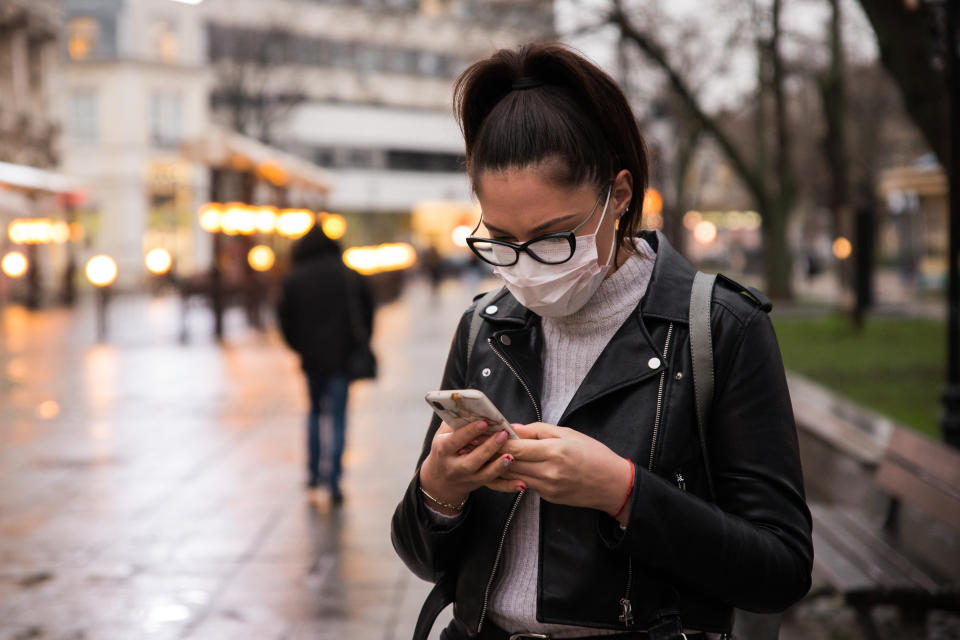COVID-19 can survive on money, phone for weeks — but experts say there's 'limited' evidence virus spreads this way
Last week, new research determined that SARS-CoV-2, the virus that causes COVID-19, can survive on your skin for up to nine hours. Now, an alarming new study suggests that it may survive on money for up to 28 days. But there’s good news too — experts say there’s little evidence that it spreads this way.

That finding comes courtesy of a new study published in Virology Journal, conducted by the Commonwealth Scientific and Industrial Research Organisation (CSIRO), a top biosecurity organization in Australia. For the study, researchers applied SARS-CoV-2 in artificial mucus to various surfaces and measured how long it took for the virus to become inactive over time. The surfaces were tested at different temperatures, including 68, 86, and 104 degrees Fahrenheit.
The researchers found that the virus survived the longest on glass and plastic. The virus was viable for up to 28 days at 68 degrees on common surfaces like glass, stainless steel and paper and polymer money. (Polymer money is more common in countries outside the U.S.) But the virus lived less than 24 hours when it was exposed to 104-degree temperatures.
“These findings demonstrate SARS-CoV-2 can remain infectious for significantly longer time periods than generally considered possible,” the study authors wrote. Study co-author Dr. Debbie Eagles said in a press release that SARS-CoV-2 is “extremely robust” at room temperature. “For context, similar experiments for influenza A have found that it survived on surfaces for 17 days, which highlights just how resilient SARS-CoV-2 is,” she said.
The length of time is surprising, especially given that it eclipsed numbers determined by past studies. Previous research has found SARS-CoV-2 can live on cardboard for up to 24 hours, stainless steel for up to 48 hours and plastics for up to 72 hours.
But it’s important to note that the study was conducted in the dark to remove the effect of UV light on the virus and that previous research has found that direct sunlight can inactivate the virus. “UV light would decrease viability time,” Dr. Amesh Adalja, senior scholar at the Johns Hopkins Center for Health Security, tells Yahoo Life.
On top of that, fomite transmission — meaning spread from surfaces to people — has not been shown to be the main driver of transmission. “Surface transmission is not the main way people are getting infected,” Adalja says. “The majority of people are getting infected from other people.”
Dr. William Schaffner, an infectious disease specialist and professor at the Vanderbilt University School of Medicine, echoes his thoughts, saying that people shouldn’t panic over the news. “Over the years, people have been concerned about money and other inanimate surfaces transmitting viruses, and we think that it can be an occasional source of transmission,” he says.
Currently, the Centers for Disease Control and Prevention (CDC) says that “it is possible” for a person to contract COVID-19 by touching an infected surface or object and then touching their mouth, nose, or eyes, but adds that “spread from touching surfaces is not thought to be a common way that COVID-19 spreads.”
It’s also unclear how infectious the level of the virus is on money over time, Schaffner says. Meaning, just because the virus may be on money doesn’t necessarily mean that it can infect a person, he explains.
Overall, experts say the latest findings only underscore the importance of washing your hands regularly. “Use lots of good hand hygiene, all the time and after you handle money,” Schaffner says.
Donald W. Schaffner, a professor at Rutgers University who has researched handwashing and cross-contamination, urges people to put the findings in perspective. “The most important thing to keep in mind is that the primary way SARS-CoV-2 is transmitted is person to person via the inhalation of droplets or aerosols from an infected person,” he tells Yahoo Life. “The evidence for transmission of the virus from inanimate objects is very limited.”
For the latest coronavirus news and updates, follow along at https://news.yahoo.com/coronavirus. According to experts, people over 60 and those who are immunocompromised continue to be the most at risk. If you have questions, please reference the CDC’s and WHO’s resource guides.
How to maintain your physical and mental health during the pandemic
Taking care of a loved one with COVID-19? Here’s how to stay healthy
Q&A with Dr. Kavita Patel: How to keep your family safe and maintain your mental health
Read more from Yahoo Life
Want lifestyle and wellness news delivered to your inbox? Sign up here for Yahoo Life’s newsletter.

